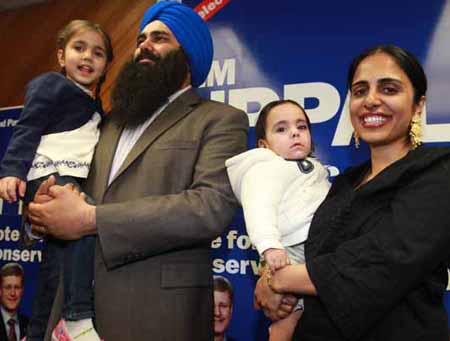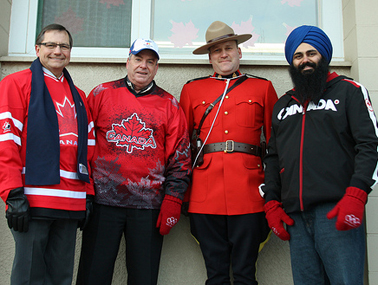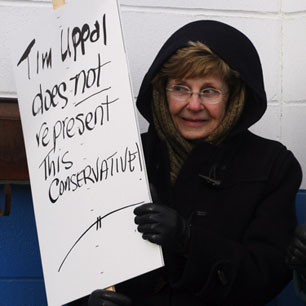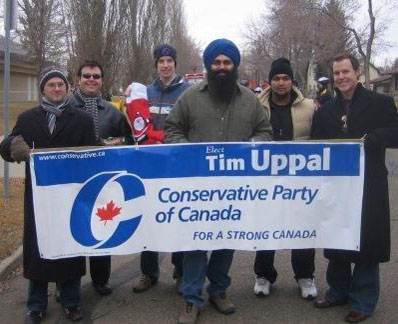Tim Uppal : new point man on Senate reform (or have old appointments already poisoned the well, etc, etc, etc)?
May 18th, 2011 | By Randall White | Category: In Brief
Conservative Tim Uppal holding daughter Kirpa, 3, with his wife Kiran and son Nihal, 1, at his campaign office in Sherwood Park, Alta.: May 2, 2011. Photograph by: Candace Elliott, edmontonjournal.com.
[UPDATED MAY 19, 20]. There is at least a strong perception that Senate reform will be one of the key issues on the early agenda of the new Harper majority government in Ottawa. (See, eg: “New momentum for Senate reform” and “Then it will be on to Senate reform.”)
In speculating about today’s much-touted federal cabinet shuffle, yesterday Althia Raj and Tobi Cohen at Postmedia News were also suggesting that: “With Harper’s Senate reform agenda now on the front burner, a new player may also replace Steven Fletcher as minister of state for democratic reform.”
This has proved an apt speculation. The new cabinet announced today may be far from earth-shaking. But it is “dotted by nine new faces,” including “Tim Uppal from Edmonton-Sherwood Park … the new man in charge of democratic reform.”
Whatever else, Tim Uppal MP is walk-and-chew-gum-at-the-same-time proof that Stephen Harper’s new Conservative Party of Canada is not your grandfather’s (or even your father’s) old Anglophile Canadian Tories. And he may prove a cunning choice as point man for whatever exact moves the Harper majority government intends to take on its step-by-step journey to serious renovation of the still unreformed Senate of Canada, at last. (Or so at least it seemed until: “Harper’s office announced just after Wednesday’s cabinet shuffle that Larry Smith and Fabian Manning were getting their seats back [via old-style prime ministerial appointments!]. They resigned to run for election, but both lost. Josée Verner, who was Canadian Heritage and Intergovernmental minister under Harper but lost her riding on May 2, is also getting a Senate seat [via the same old-style tricks].”)
* * * *

2010 Olympic Torch Relay in Fort Saskatchewan; l to r: Alberta Premier Ed Stelmach, Fort Saskatchewan Mayor Jim Sheasgreen, member of the RCMP, and Edmonton-Sherwood Park MP Tim Uppal.
Tim Uppal was born in New Westminster BC in 1974, but “has spent most of his life in Edmonton,” Alberta. He “comes from a very hardworking and proud Canadian family,” which “originally came from northern India, Punjab. In Canada, his grandfather worked on the railroad system that helped build this country and his father worked in coal mines and sawmills in Alberta and British Columbia.” Before his political career, Tim Uppal helped “run a family business in Sherwood Park Mall” in Edmonton, and “was a Residential Mortgage Manager for TD Canada Trust.”
Uppal “ran for the Canadian Alliance in the 2000 federal election in Edmonton Southeast, where he lost to David Kilgour [the Conservative apostate who became a strange Alberta Liberal] by less than 5,000 votes. In a re-match in the 2004 federal election in Edmonton-Beaumont, Kilgour defeated Uppal, who was now running for the Conservative Party of Canada, by just 134 votes.” Uppal “subsequently lost the Conservative nomination for the 2006 election in Edmonton-Mill Woods-Beaumont to Mike Lake.” But he finally “won the nomination as the Conservative candidate for Edmonton–Sherwood Park in the 2008 election.” And even though “some members of the riding association board quit in protest” and backed an independent conservative candidate (James Ford), this time Uppal managed to win the seat “by a margin of 1,668 votes.”

Not all conservatives in Edmonton-Sherwood Park have supported Tim Uppal. But he has now taken the seat twice – in 2008 and 2011 – as the official candidate of Stephen Harper’s new Conservative Party of Canada.
In the election this past May 2, 2011 Tim Uppal “won his seat in Edmonton-Sherwood Park with a 15-per-cent vote margin over his closest rival as of late Monday [once again the independent conservative James Ford], joining the ranks of his party’s majority.” He “said he is looking forward to working with a majority government. ‘It’s going to be a stable government that will continue running the economy well. … You’ll see more of that. And with a majority government, all the important legislation that we’ve been trying to bring forth in the past won’t be stalled and gutted by the opposition now.’”
Ever since Bert Brown, “a farmer from Kathyrn, Alta … plowed the message ‘Triple E Senate or Else’ into his neighbour’s barley field,” the kind of Canadian Senate reform that has its modern beginnings in Alberta in the 1980s has been too often viewed elsewhere as some red-neck rural populist’s fantasy, unsuited to the increasingly diverse urban Canadian federation of the 21st century. (Actually the Triple E Senate or Else’ here comes from the CBC website: my own perhaps equally hazy recollection is that Mr. Brown just ploughed the three letters “EEE” into his “neighbour’s barley field.”)
There certainly remain some crucial problems with Mr. Brown’s “Triple E” Senate reform concept for Canada today. And if Tim Uppal is going to do more than just shepherd the two outstanding Harper minority government bills on Senate term limits and Senate elections through a new Canadian House of Commons in which Mr. Harper and his party can pretty much do whatever they like, he will have to come to grips with these problems.
Having a hard-working urban-based Canadian Sikh in a blue turban preside over whatever is to be done could nonetheless prove some form of intriguing and even innovative asset – symbolically at the very least! We will still, of course, have to wait and see what finally happens, down on the ground, in the real world of Canada and its often fractious provinces (some of whom have threatened to take any Senate reforms they do not like to court, to test their constitutionality, regardless of what the majority in the federal Parliament at Ottawa may decide). But here’s hoping that Mr. Uppal from Edmonton will finally be able to do something sensible with the Canadian so-called “upper house” of Parliament, that Mr. Harper himself so aptly christened “a relic of the 19th century” some five and a half years ago. It is about time, and the new majority government has no excuse to fail on this file yet again. As Tim Uppal has said: “with a majority government, all the important legislation that we’ve been trying to bring forth in the past won’t be stalled and gutted by the opposition now.”
UPDATE MAY 19: Through the vagaries of my ordinary work schedule, I did not catch up with the news about the reappointments of former Senators Larry Smith and Fabian Manning (who were defeated in their attempts to actually get elected to the Canadian House of Commons) , and the fresh Senate appointment of defeated Canadian Heritage and Intergovernmental minister Josée Verner, as announced by Harper’s office just after Wednesday’s cabinet shuffle, until early this morning.
NDP leader Jack Layton has criticized these appointments, and said “Mr. Harper talks about Senate reform but he’s doing things in the same old way, in fact even worse.”
You don’t have to be the leader of the official opposition, however, to smell some kind of dead fish in all this. Here’s Scott Stinson in the relentlessly conservative National Post: “It’s not just that Mr. Harper decided to appoint three more unabashed partisans to the Senate. It’s not just that the Senators-to-be, Larry Smith, Fabian Manning, and Josée Verner, were rejected by Canadian voters only two weeks ago. And it’s not just that the PMO’s announcement of the appointments was seemingly timed to be as contemptuous of the public as possible – just after the new Cabinet was announced, and mere moments after the Prime Minister had completed a question-and-answer session with the media in Ottawa. It’s all of it, in one tidy package: more patronage, less respect for democracy and less accountability. He’s long since given up the pledge to only appoint “elected senators,” of course, but it takes some gumption to swallow all those principles at once … Marjory LeBreton, the Senate government leader, defended the appointments – for the man who made them wasn’t around to explain them to the press – as part of the Conservative plan to reform the Upper House, which would include elections. But the government seemingly had control of the Senate. If it is serious about reform, it could get started on that particular can of constitutional worms right away, and if it ultimately found that it needed more numbers to implement its package, it could appoint more senators at that point. There is no other way to view Wednesday’s announcements other than that they are pillow-soft landing spots for Tory cronies who failed to land jobs on May 2.”
To talk about these three appointments as somehow “poisoning the well” for any more serious future reform efforts somehow engineered or otherwise presided over by the new democratic reform minister Tim Uppal is no doubt not quite apt in some ways. The Harper Conservatives now have their majority in the already elected branch of Parliament, and can do whatever they want, when they want. On Senate reform, as on everything else, what Mr. Layton thinks really doesn’t matter. (And of course what journalists like Scott Stinson write matters even less – to say nothing of what people like me may think, outside or inside the office or anywhere else!) Yet the appointments certainly do make you suddenly sit up and wonder whether Mr. Uppal or Mr. Harper or anyone else inside the new majority government in Ottawa ever will really do anything worthwhile about the unreformed Senate of Canada?
UPDATE MAY 20: There has been some additional discussion in at least a few organs of the mass media, on both Tim Uppal’s new role in the current Harper Senate reform agenda, and the three fresh old-style appointments announced on Wednesday.
See, eg: “Premiers heap scorn on Harper’s latest Senate appointments” ; “Audacious Senate appointments are Harper’s gift to Layton” ; and “Senate appointments part of plan to democratize upper house: PMO” (the kind of Orwellian double-think argument that only people who genuinely do believe the relevant public is quite stupid can make, as Scott Stinson’s National Post article yesterday shows quite nicely).
“Tories drop an ‘E’ from Senate reform plan” also clarifies (or at least appears to) that the new majority government’s current step by step Senate reform agenda goes no further than the two term-limit and Senate election “consultation” bills which the old Harper minority governments introduced – twice! (Though I think myself that this is not all that bad a thing, for the time being. The so-called missing “E” of equal provincial representation here is unworkable in a Canadian context. And more realistic change to the existing provincial distribution of Senate seats, which is ultimately necessary for any serious approximation of the Senate’s crucial regional representation agenda, no doubt, requires further study and debate, as well as the kind of “opening up the Constitution …Â can of worms … that’s not something that we’re looking at,” as Tim Uppal explains. If Mr. Uppal were really taking his job seriously, he might at least want to somehow help start the further study and debate required. But, in the real world right now … )
Finally an article by Andrew Potter in Maclean’s (“Got Senate reform if you want it”) raises what strikes me as an unhappily defeatist perspective on the serious reform agenda of the past quarter century. But it also underlines an apparently very realistic question at the moment: “ In the end, though, all of this might be just whistling in the wind, since it isn’t clear Stephen Harper is serious about Senate reform. Even such a mild reform as a more legitimate appointments process would involve the prime minister actually focusing his attention and expending some political capital. Given Harper’s fecklessness on this score, it would appear that the status quo continues to serve everyone’s interests, except those of Canadians.”




WELL:
HERE WE GO…….SENATE REFORM……..COME ON…LETS GET REAL..INTIMIDATION, HARASEMENT …..MISUSE OF POSITION, PRIME MINISTER ON HOT SEAT….WHAT KIND OF FOOLS DO YOU PEOPLE TAKE US FOR…….TIM TIM TIM GET REAL…………..THE SENATE IS A MESS OF CONSERVATIVE YES MEN AND WOMEN….WHAT A JOKE.SO MUCH FOR DEMOCRACY……WHERE’S ALL YOUR FLYERS NOW THAT ARE PUT IN MY MAIL BOX,………WHICH ARE JUST THROWN IN THE RECYCLE…..BIN, ALONG WITH THE REST OF P.C. PROPAGANDA……….ENOUGH IS ENOUGH……